Managing Oneself: Reflective Essay on Personal Strengths and Values
VerifiedAdded on 2023/06/07
|7
|1582
|279
Essay
AI Summary
This reflective essay examines the principles of self-management, focusing on the five crucial questions proposed by Peter Drucker and others. The essay delves into the importance of identifying one's strengths, understanding how one performs best, defining personal values, determining where one belongs in a career, and identifying how one can contribute meaningfully to an organization. The author reflects on these aspects, providing personal examples and insights into how self-awareness and strategic career planning can lead to greater success and fulfillment. The essay emphasizes the need for continuous self-assessment and adaptation in order to navigate career opportunities effectively. It provides a detailed exploration of the principles of self-management, offering valuable insights into personal and professional development.
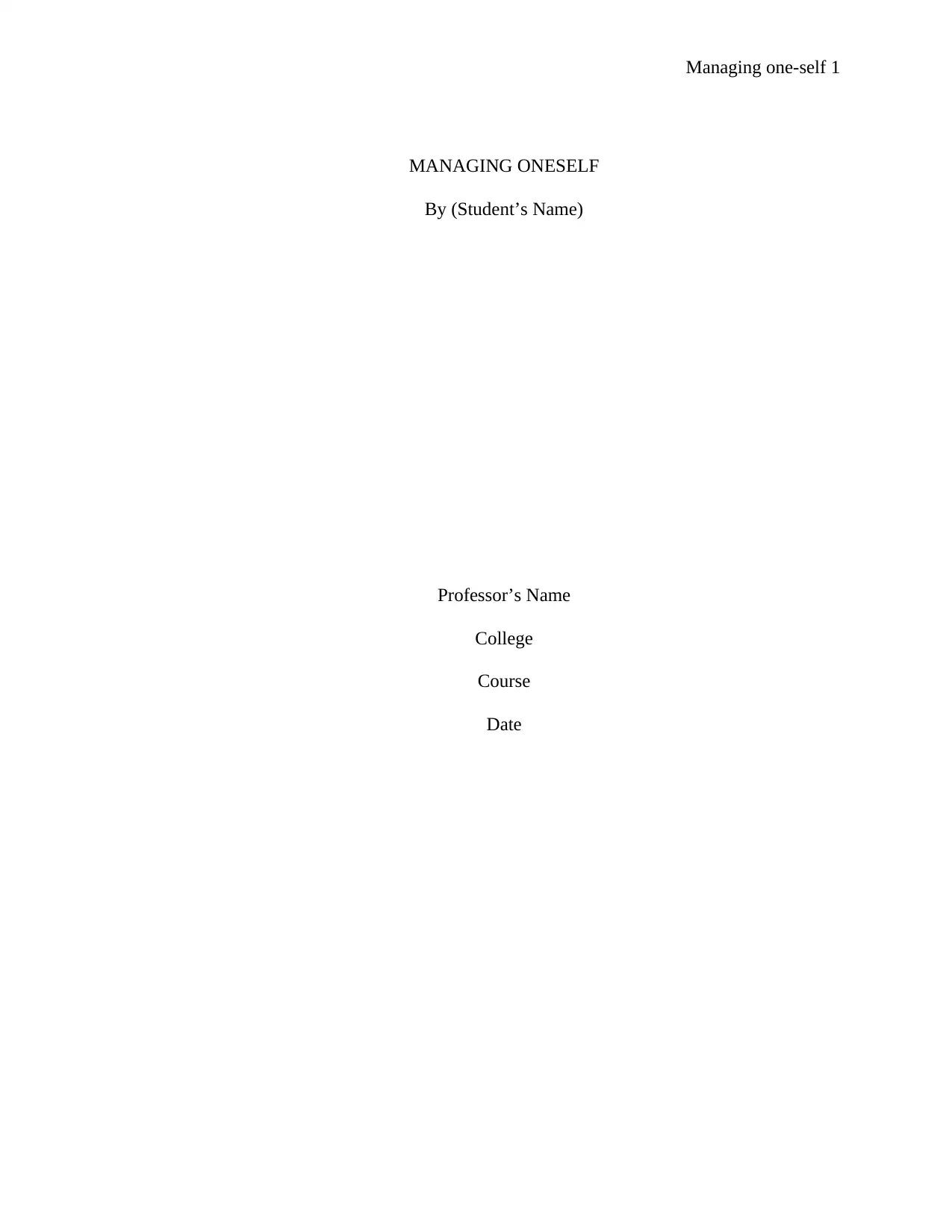
Managing one-self 1
MANAGING ONESELF
By (Student’s Name)
Professor’s Name
College
Course
Date
MANAGING ONESELF
By (Student’s Name)
Professor’s Name
College
Course
Date
Paraphrase This Document
Need a fresh take? Get an instant paraphrase of this document with our AI Paraphraser
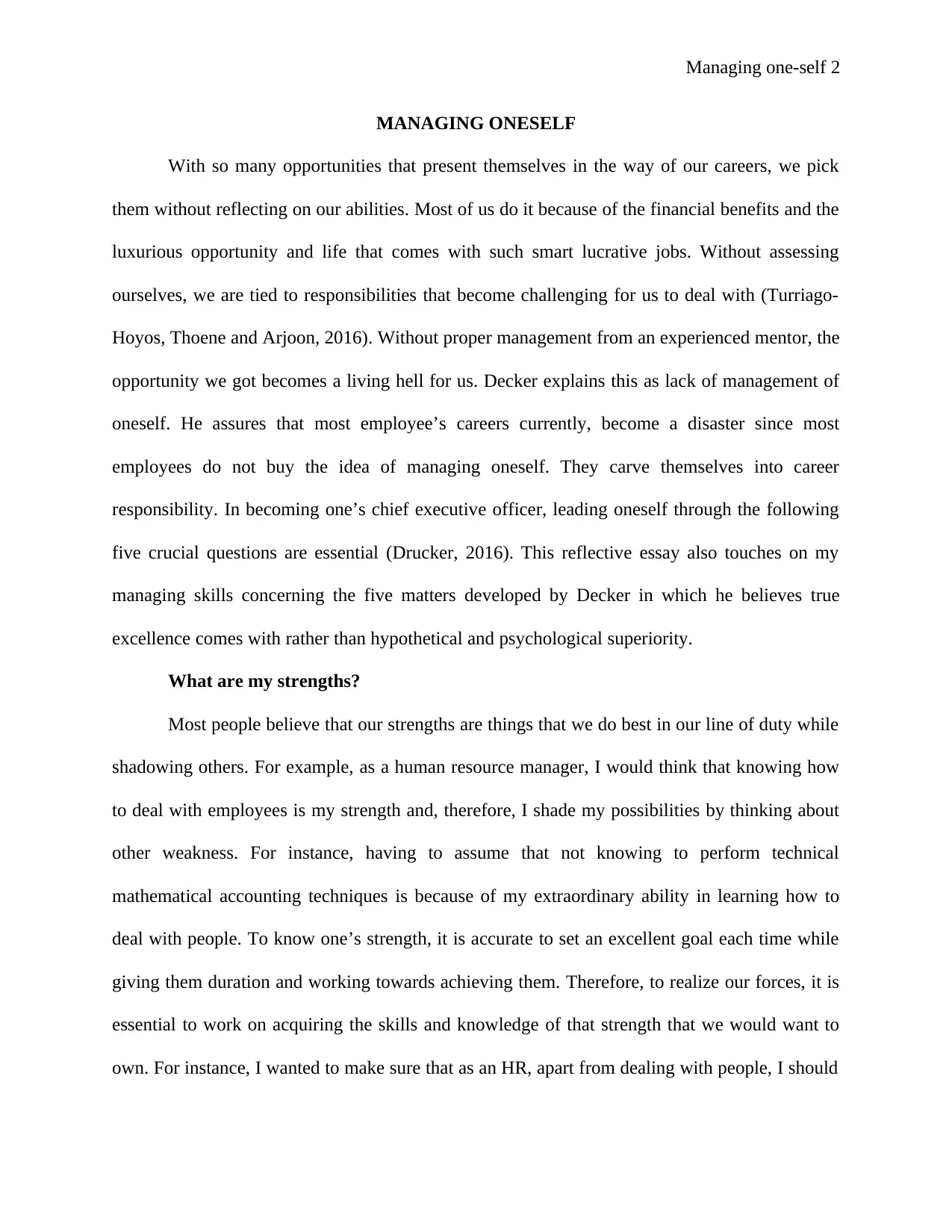
Managing one-self 2
MANAGING ONESELF
With so many opportunities that present themselves in the way of our careers, we pick
them without reflecting on our abilities. Most of us do it because of the financial benefits and the
luxurious opportunity and life that comes with such smart lucrative jobs. Without assessing
ourselves, we are tied to responsibilities that become challenging for us to deal with (Turriago-
Hoyos, Thoene and Arjoon, 2016). Without proper management from an experienced mentor, the
opportunity we got becomes a living hell for us. Decker explains this as lack of management of
oneself. He assures that most employee’s careers currently, become a disaster since most
employees do not buy the idea of managing oneself. They carve themselves into career
responsibility. In becoming one’s chief executive officer, leading oneself through the following
five crucial questions are essential (Drucker, 2016). This reflective essay also touches on my
managing skills concerning the five matters developed by Decker in which he believes true
excellence comes with rather than hypothetical and psychological superiority.
What are my strengths?
Most people believe that our strengths are things that we do best in our line of duty while
shadowing others. For example, as a human resource manager, I would think that knowing how
to deal with employees is my strength and, therefore, I shade my possibilities by thinking about
other weakness. For instance, having to assume that not knowing to perform technical
mathematical accounting techniques is because of my extraordinary ability in learning how to
deal with people. To know one’s strength, it is accurate to set an excellent goal each time while
giving them duration and working towards achieving them. Therefore, to realize our forces, it is
essential to work on acquiring the skills and knowledge of that strength that we would want to
own. For instance, I wanted to make sure that as an HR, apart from dealing with people, I should
MANAGING ONESELF
With so many opportunities that present themselves in the way of our careers, we pick
them without reflecting on our abilities. Most of us do it because of the financial benefits and the
luxurious opportunity and life that comes with such smart lucrative jobs. Without assessing
ourselves, we are tied to responsibilities that become challenging for us to deal with (Turriago-
Hoyos, Thoene and Arjoon, 2016). Without proper management from an experienced mentor, the
opportunity we got becomes a living hell for us. Decker explains this as lack of management of
oneself. He assures that most employee’s careers currently, become a disaster since most
employees do not buy the idea of managing oneself. They carve themselves into career
responsibility. In becoming one’s chief executive officer, leading oneself through the following
five crucial questions are essential (Drucker, 2016). This reflective essay also touches on my
managing skills concerning the five matters developed by Decker in which he believes true
excellence comes with rather than hypothetical and psychological superiority.
What are my strengths?
Most people believe that our strengths are things that we do best in our line of duty while
shadowing others. For example, as a human resource manager, I would think that knowing how
to deal with employees is my strength and, therefore, I shade my possibilities by thinking about
other weakness. For instance, having to assume that not knowing to perform technical
mathematical accounting techniques is because of my extraordinary ability in learning how to
deal with people. To know one’s strength, it is accurate to set an excellent goal each time while
giving them duration and working towards achieving them. Therefore, to realize our forces, it is
essential to work on acquiring the skills and knowledge of that strength that we would want to
own. For instance, I wanted to make sure that as an HR, apart from dealing with people, I should
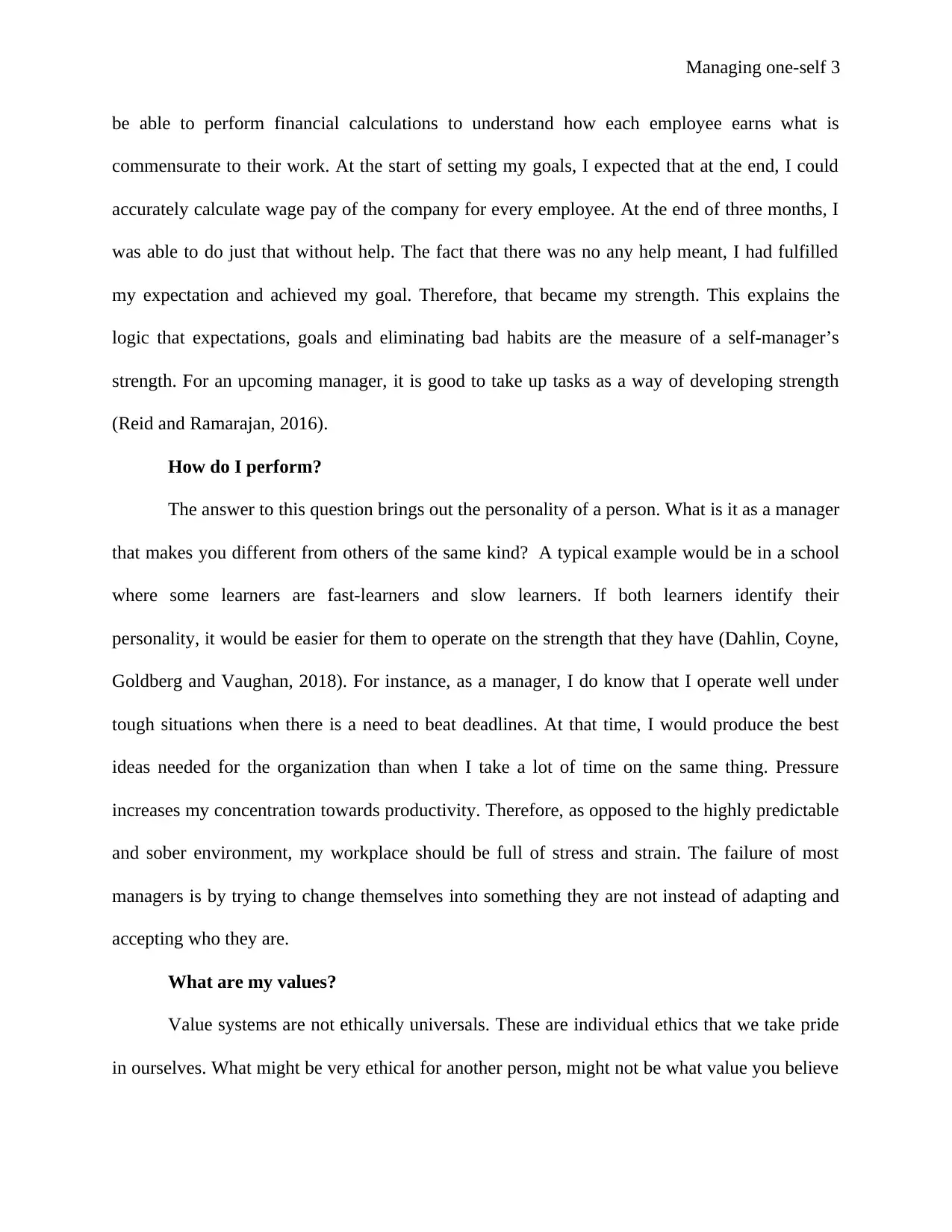
Managing one-self 3
be able to perform financial calculations to understand how each employee earns what is
commensurate to their work. At the start of setting my goals, I expected that at the end, I could
accurately calculate wage pay of the company for every employee. At the end of three months, I
was able to do just that without help. The fact that there was no any help meant, I had fulfilled
my expectation and achieved my goal. Therefore, that became my strength. This explains the
logic that expectations, goals and eliminating bad habits are the measure of a self-manager’s
strength. For an upcoming manager, it is good to take up tasks as a way of developing strength
(Reid and Ramarajan, 2016).
How do I perform?
The answer to this question brings out the personality of a person. What is it as a manager
that makes you different from others of the same kind? A typical example would be in a school
where some learners are fast-learners and slow learners. If both learners identify their
personality, it would be easier for them to operate on the strength that they have (Dahlin, Coyne,
Goldberg and Vaughan, 2018). For instance, as a manager, I do know that I operate well under
tough situations when there is a need to beat deadlines. At that time, I would produce the best
ideas needed for the organization than when I take a lot of time on the same thing. Pressure
increases my concentration towards productivity. Therefore, as opposed to the highly predictable
and sober environment, my workplace should be full of stress and strain. The failure of most
managers is by trying to change themselves into something they are not instead of adapting and
accepting who they are.
What are my values?
Value systems are not ethically universals. These are individual ethics that we take pride
in ourselves. What might be very ethical for another person, might not be what value you believe
be able to perform financial calculations to understand how each employee earns what is
commensurate to their work. At the start of setting my goals, I expected that at the end, I could
accurately calculate wage pay of the company for every employee. At the end of three months, I
was able to do just that without help. The fact that there was no any help meant, I had fulfilled
my expectation and achieved my goal. Therefore, that became my strength. This explains the
logic that expectations, goals and eliminating bad habits are the measure of a self-manager’s
strength. For an upcoming manager, it is good to take up tasks as a way of developing strength
(Reid and Ramarajan, 2016).
How do I perform?
The answer to this question brings out the personality of a person. What is it as a manager
that makes you different from others of the same kind? A typical example would be in a school
where some learners are fast-learners and slow learners. If both learners identify their
personality, it would be easier for them to operate on the strength that they have (Dahlin, Coyne,
Goldberg and Vaughan, 2018). For instance, as a manager, I do know that I operate well under
tough situations when there is a need to beat deadlines. At that time, I would produce the best
ideas needed for the organization than when I take a lot of time on the same thing. Pressure
increases my concentration towards productivity. Therefore, as opposed to the highly predictable
and sober environment, my workplace should be full of stress and strain. The failure of most
managers is by trying to change themselves into something they are not instead of adapting and
accepting who they are.
What are my values?
Value systems are not ethically universals. These are individual ethics that we take pride
in ourselves. What might be very ethical for another person, might not be what value you believe
⊘ This is a preview!⊘
Do you want full access?
Subscribe today to unlock all pages.

Trusted by 1+ million students worldwide
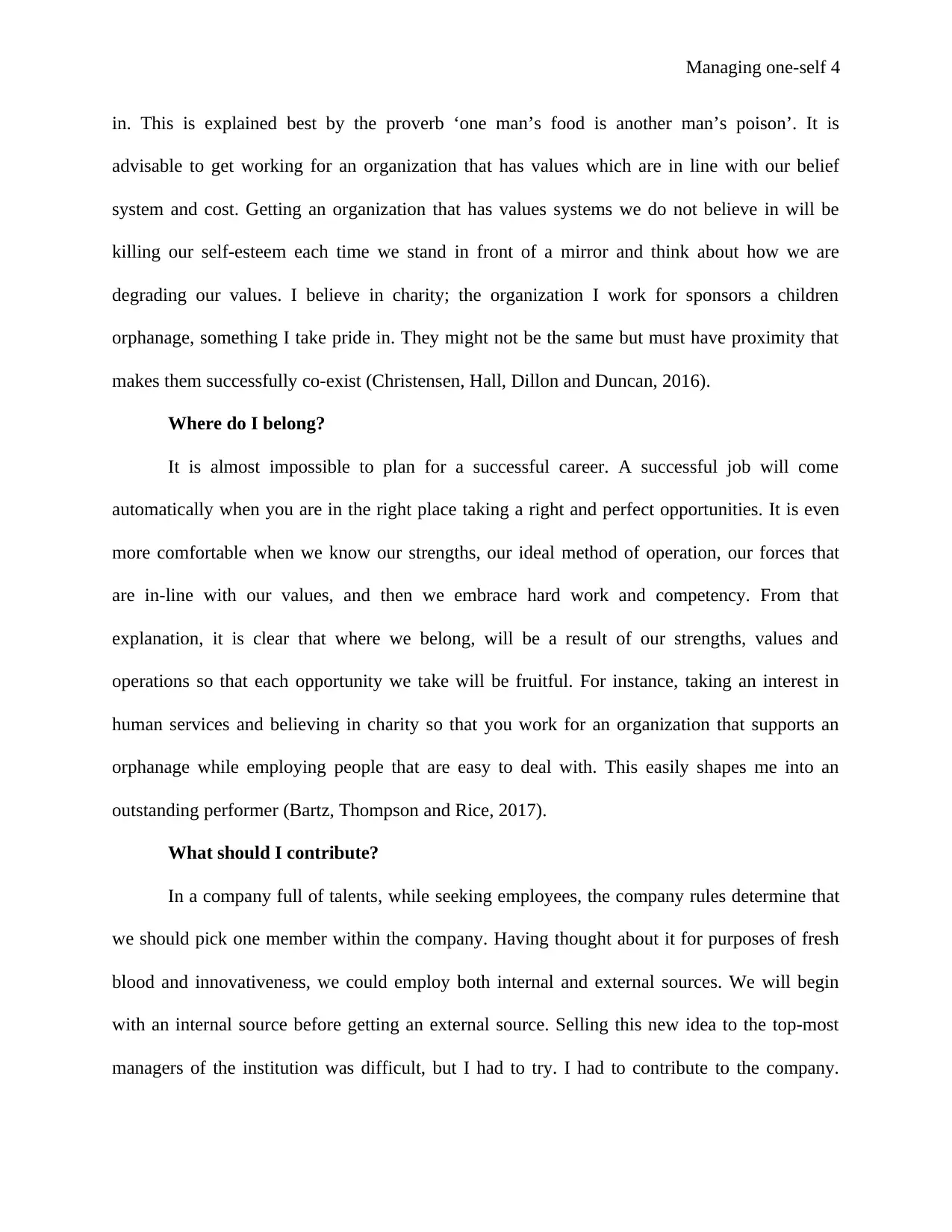
Managing one-self 4
in. This is explained best by the proverb ‘one man’s food is another man’s poison’. It is
advisable to get working for an organization that has values which are in line with our belief
system and cost. Getting an organization that has values systems we do not believe in will be
killing our self-esteem each time we stand in front of a mirror and think about how we are
degrading our values. I believe in charity; the organization I work for sponsors a children
orphanage, something I take pride in. They might not be the same but must have proximity that
makes them successfully co-exist (Christensen, Hall, Dillon and Duncan, 2016).
Where do I belong?
It is almost impossible to plan for a successful career. A successful job will come
automatically when you are in the right place taking a right and perfect opportunities. It is even
more comfortable when we know our strengths, our ideal method of operation, our forces that
are in-line with our values, and then we embrace hard work and competency. From that
explanation, it is clear that where we belong, will be a result of our strengths, values and
operations so that each opportunity we take will be fruitful. For instance, taking an interest in
human services and believing in charity so that you work for an organization that supports an
orphanage while employing people that are easy to deal with. This easily shapes me into an
outstanding performer (Bartz, Thompson and Rice, 2017).
What should I contribute?
In a company full of talents, while seeking employees, the company rules determine that
we should pick one member within the company. Having thought about it for purposes of fresh
blood and innovativeness, we could employ both internal and external sources. We will begin
with an internal source before getting an external source. Selling this new idea to the top-most
managers of the institution was difficult, but I had to try. I had to contribute to the company.
in. This is explained best by the proverb ‘one man’s food is another man’s poison’. It is
advisable to get working for an organization that has values which are in line with our belief
system and cost. Getting an organization that has values systems we do not believe in will be
killing our self-esteem each time we stand in front of a mirror and think about how we are
degrading our values. I believe in charity; the organization I work for sponsors a children
orphanage, something I take pride in. They might not be the same but must have proximity that
makes them successfully co-exist (Christensen, Hall, Dillon and Duncan, 2016).
Where do I belong?
It is almost impossible to plan for a successful career. A successful job will come
automatically when you are in the right place taking a right and perfect opportunities. It is even
more comfortable when we know our strengths, our ideal method of operation, our forces that
are in-line with our values, and then we embrace hard work and competency. From that
explanation, it is clear that where we belong, will be a result of our strengths, values and
operations so that each opportunity we take will be fruitful. For instance, taking an interest in
human services and believing in charity so that you work for an organization that supports an
orphanage while employing people that are easy to deal with. This easily shapes me into an
outstanding performer (Bartz, Thompson and Rice, 2017).
What should I contribute?
In a company full of talents, while seeking employees, the company rules determine that
we should pick one member within the company. Having thought about it for purposes of fresh
blood and innovativeness, we could employ both internal and external sources. We will begin
with an internal source before getting an external source. Selling this new idea to the top-most
managers of the institution was difficult, but I had to try. I had to contribute to the company.
Paraphrase This Document
Need a fresh take? Get an instant paraphrase of this document with our AI Paraphraser
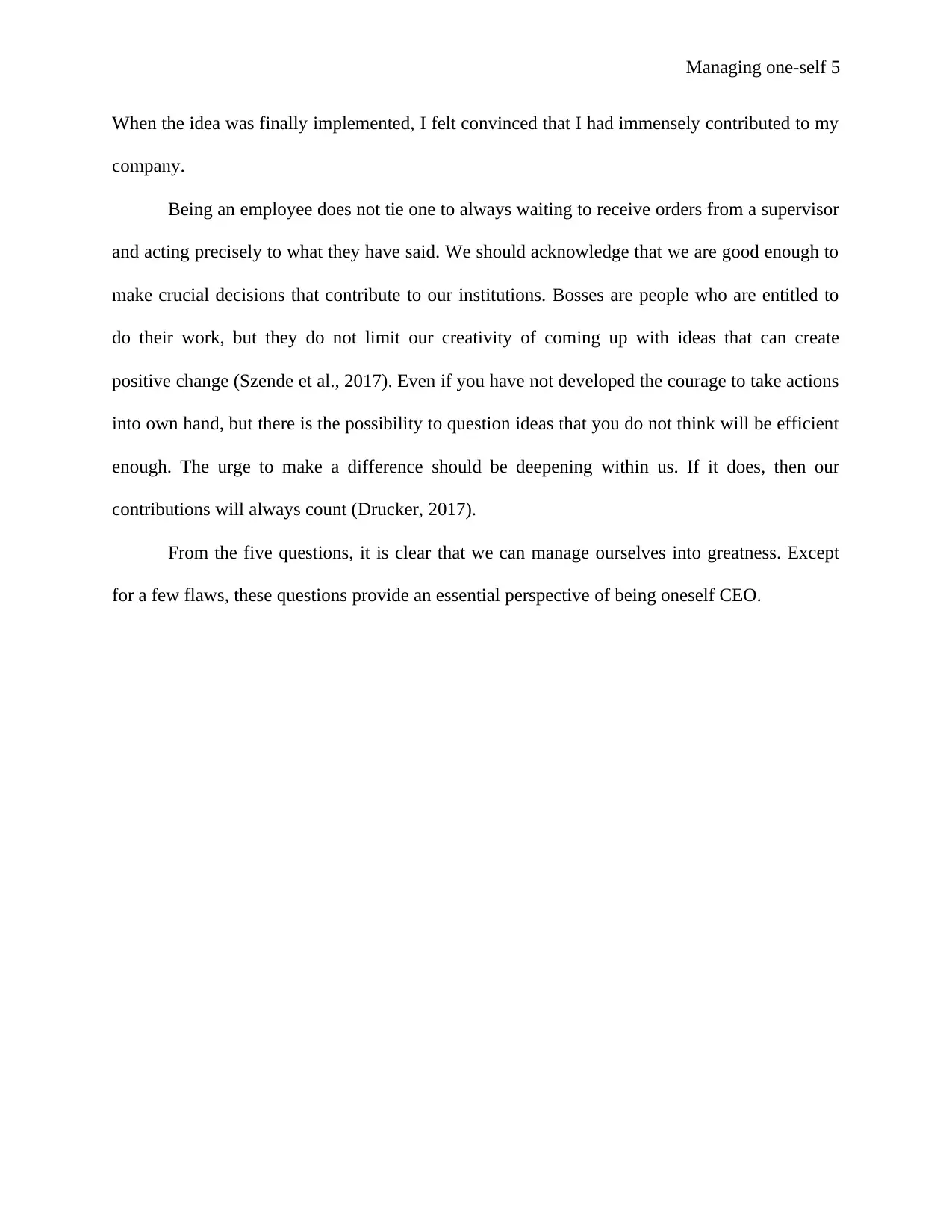
Managing one-self 5
When the idea was finally implemented, I felt convinced that I had immensely contributed to my
company.
Being an employee does not tie one to always waiting to receive orders from a supervisor
and acting precisely to what they have said. We should acknowledge that we are good enough to
make crucial decisions that contribute to our institutions. Bosses are people who are entitled to
do their work, but they do not limit our creativity of coming up with ideas that can create
positive change (Szende et al., 2017). Even if you have not developed the courage to take actions
into own hand, but there is the possibility to question ideas that you do not think will be efficient
enough. The urge to make a difference should be deepening within us. If it does, then our
contributions will always count (Drucker, 2017).
From the five questions, it is clear that we can manage ourselves into greatness. Except
for a few flaws, these questions provide an essential perspective of being oneself CEO.
When the idea was finally implemented, I felt convinced that I had immensely contributed to my
company.
Being an employee does not tie one to always waiting to receive orders from a supervisor
and acting precisely to what they have said. We should acknowledge that we are good enough to
make crucial decisions that contribute to our institutions. Bosses are people who are entitled to
do their work, but they do not limit our creativity of coming up with ideas that can create
positive change (Szende et al., 2017). Even if you have not developed the courage to take actions
into own hand, but there is the possibility to question ideas that you do not think will be efficient
enough. The urge to make a difference should be deepening within us. If it does, then our
contributions will always count (Drucker, 2017).
From the five questions, it is clear that we can manage ourselves into greatness. Except
for a few flaws, these questions provide an essential perspective of being oneself CEO.
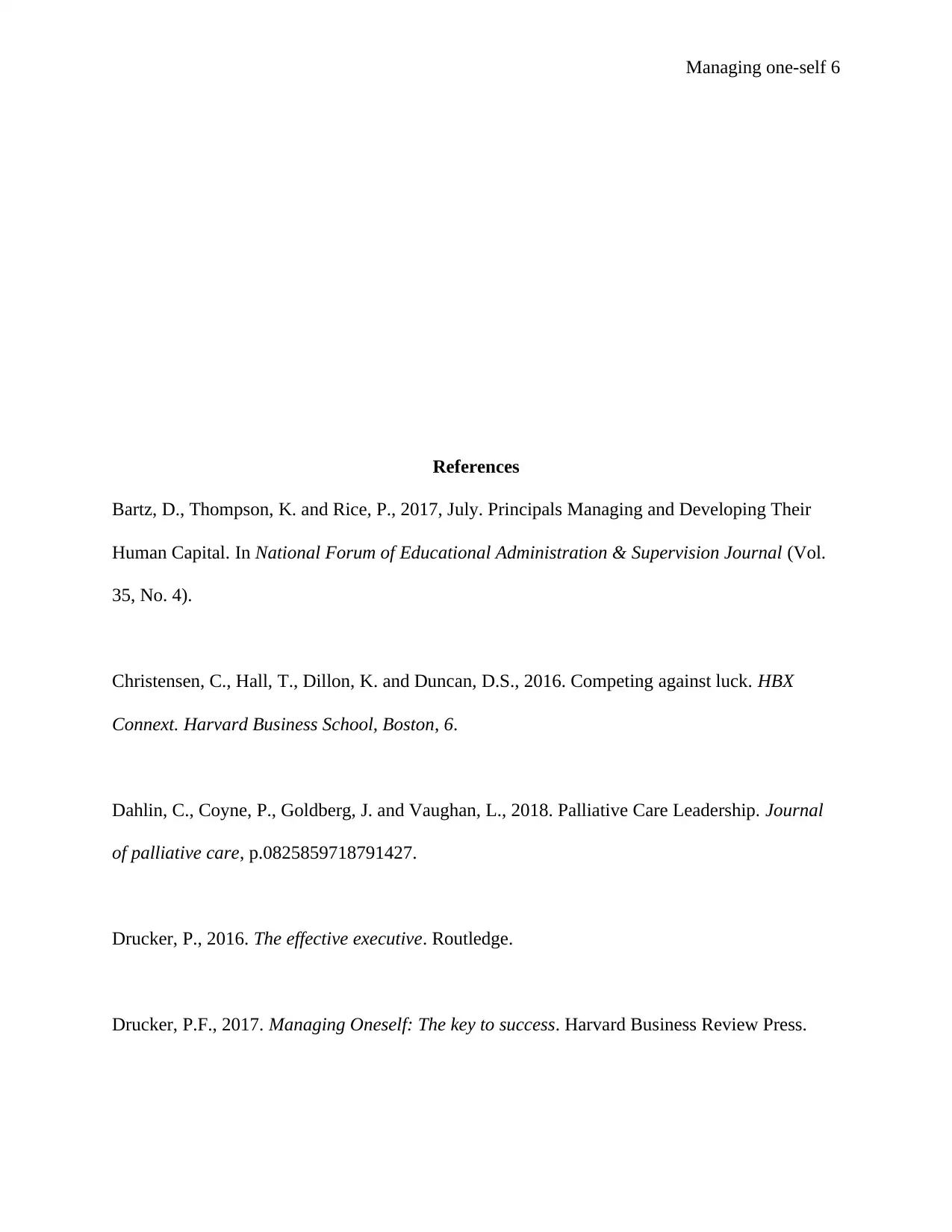
Managing one-self 6
References
Bartz, D., Thompson, K. and Rice, P., 2017, July. Principals Managing and Developing Their
Human Capital. In National Forum of Educational Administration & Supervision Journal (Vol.
35, No. 4).
Christensen, C., Hall, T., Dillon, K. and Duncan, D.S., 2016. Competing against luck. HBX
Connext. Harvard Business School, Boston, 6.
Dahlin, C., Coyne, P., Goldberg, J. and Vaughan, L., 2018. Palliative Care Leadership. Journal
of palliative care, p.0825859718791427.
Drucker, P., 2016. The effective executive. Routledge.
Drucker, P.F., 2017. Managing Oneself: The key to success. Harvard Business Review Press.
References
Bartz, D., Thompson, K. and Rice, P., 2017, July. Principals Managing and Developing Their
Human Capital. In National Forum of Educational Administration & Supervision Journal (Vol.
35, No. 4).
Christensen, C., Hall, T., Dillon, K. and Duncan, D.S., 2016. Competing against luck. HBX
Connext. Harvard Business School, Boston, 6.
Dahlin, C., Coyne, P., Goldberg, J. and Vaughan, L., 2018. Palliative Care Leadership. Journal
of palliative care, p.0825859718791427.
Drucker, P., 2016. The effective executive. Routledge.
Drucker, P.F., 2017. Managing Oneself: The key to success. Harvard Business Review Press.
⊘ This is a preview!⊘
Do you want full access?
Subscribe today to unlock all pages.

Trusted by 1+ million students worldwide
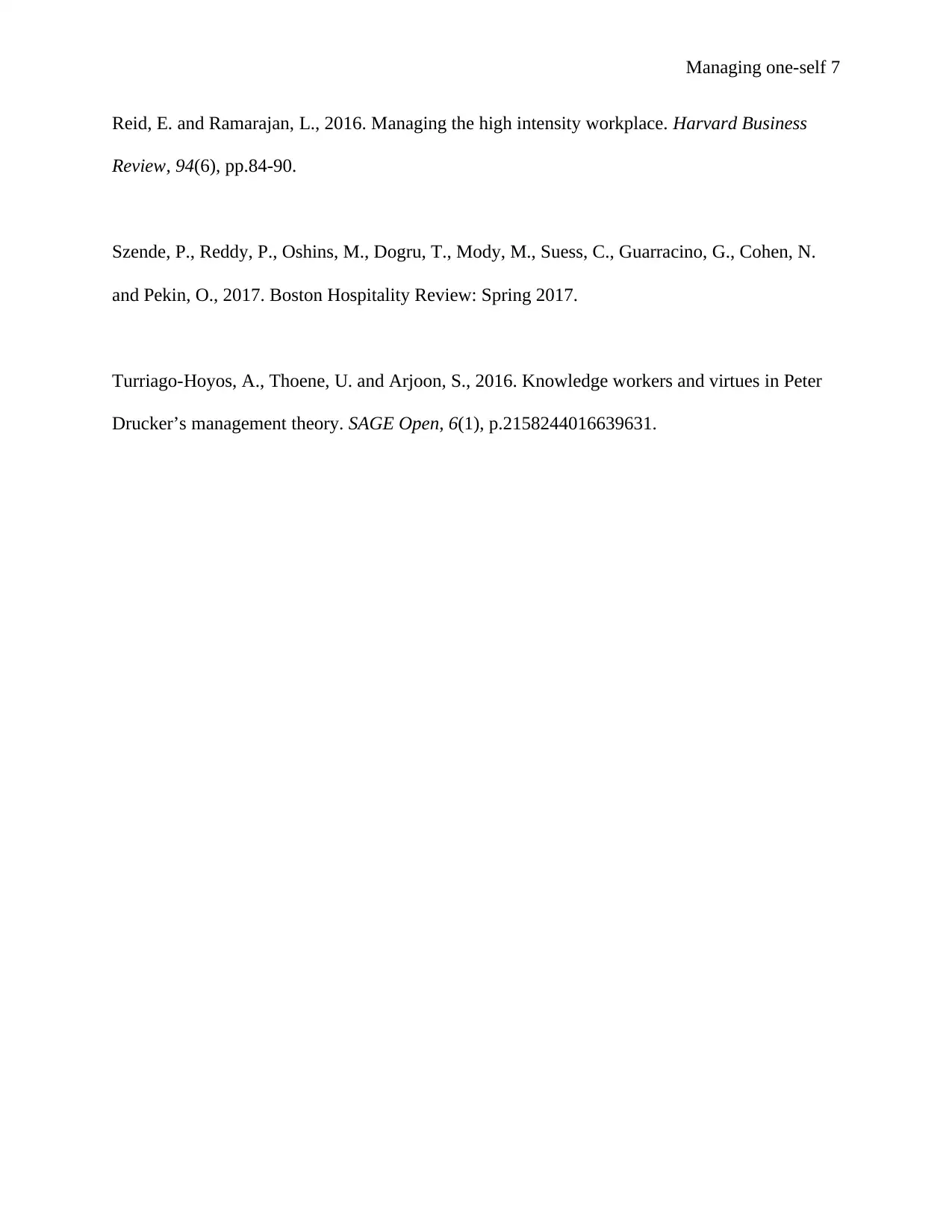
Managing one-self 7
Reid, E. and Ramarajan, L., 2016. Managing the high intensity workplace. Harvard Business
Review, 94(6), pp.84-90.
Szende, P., Reddy, P., Oshins, M., Dogru, T., Mody, M., Suess, C., Guarracino, G., Cohen, N.
and Pekin, O., 2017. Boston Hospitality Review: Spring 2017.
Turriago-Hoyos, A., Thoene, U. and Arjoon, S., 2016. Knowledge workers and virtues in Peter
Drucker’s management theory. SAGE Open, 6(1), p.2158244016639631.
Reid, E. and Ramarajan, L., 2016. Managing the high intensity workplace. Harvard Business
Review, 94(6), pp.84-90.
Szende, P., Reddy, P., Oshins, M., Dogru, T., Mody, M., Suess, C., Guarracino, G., Cohen, N.
and Pekin, O., 2017. Boston Hospitality Review: Spring 2017.
Turriago-Hoyos, A., Thoene, U. and Arjoon, S., 2016. Knowledge workers and virtues in Peter
Drucker’s management theory. SAGE Open, 6(1), p.2158244016639631.
1 out of 7
Related Documents
Your All-in-One AI-Powered Toolkit for Academic Success.
+13062052269
info@desklib.com
Available 24*7 on WhatsApp / Email
![[object Object]](/_next/static/media/star-bottom.7253800d.svg)
Unlock your academic potential
Copyright © 2020–2026 A2Z Services. All Rights Reserved. Developed and managed by ZUCOL.





